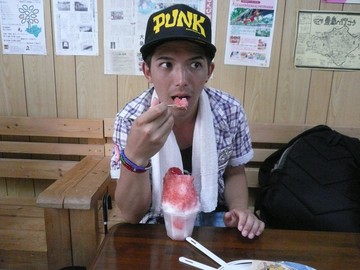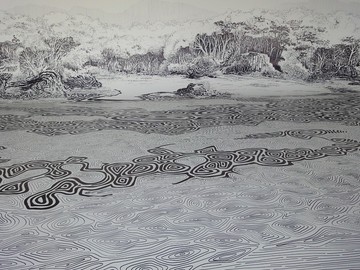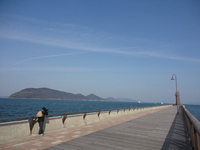2010年11月25日
The Last Word
The Last Word On Setouchi Art Festival 2010
Curious about the festival’s impact on the islands and on people, I have been talking with local artists and friends involved in the festival as well as others like me who experienced it.

Seto Inland Sea
According to my sources, while many islanders warmly welcomed the visitors, they are now breathing a sigh of relief. The party is over and they are happy to return to the slower pace of “island time”.

Island time on Teshima
During the festival, particularly on weekends and through most of October, some villages were so crowded that local residents had difficulty just walking down the street to get home. And, unfortunately, some people left their garbage behind.
On the bright side, the islanders realized that people actually enjoyed coming to their islands. Left behind by mainstream society, their backwater villages are now on the brink of disappearing but the festival demonstrated that they do indeed have charm and potential. The question is where to go from here.

Teshima
If nothing else, Art Setouchi has forced those directly involved as well as those who just live here to ponder this very question. Further action, particularly by the islanders, is needed to explore the opportunities provided by the festival. Ideally, each island will develop their own style of collaboration with other people living in the prefecture as well as with artists – a collaboration that promotes sustainable action.

Lightening Shodoshima by Sense Art Studio
As a local and frequent visitor to the festival, I would have to say that it was nothing but positive. It gave me a chance to experience and appreciate the beauty of what we have. It also, as one friend aptly put it, served as a medium for people to make meaningful connections, with each other and with art and nature. What kept so many people going back? In their words…

Farther Memory by Chiharu Shiota
… art in architecture/architecture in art

Project by Aichi Prefectural University of Fine Arts and Music Team
… being able to walk right into an exhibit

House of Shodoshima by Wang Wen-Chih
and enjoy it like this

inside

and out!

…art in nature/nature in art

When You Think of an Island by Rika Aki, Shodoshima
…having the time to listen
…to voices whispering through bamboo pipes

Voices from Disappeared People by Dadang Christanto, Shodoshima
…and seashells quivering by a spring.

When You Think of an Island by Rika Aki, Shodoshima
… strange and wonderful encounters, such as walking through terraced rice fields in the middle of nowhere

and bumping into a friend from Tokyo.

Art within the ordinary made life extraordinary.

Hello Hachijuro by Hiroshi Fuji, Teshima

Ichigoya’s homemade strawberry sauce on ice, Teshima
And it was just so much fun!

For those of you who can, I hope you will consider going back to the islands on weekends and checking out the sites that are still open. The volunteers bravely manning the sites will be very glad to see you! If you don’t have a Japanese friend to read the schedules for you (See previous post), post a comment about where and when you want to go and I’ll let you know if it’s open.
For fans of Brazilian artist Oscar Oiwa
Oiwa Island, an amazing work drawn entirely with black magic markers and transformed into an endless landscape by mirrors, was sadly destroyed in a fire one month before the festival ended.

The work, however, has been awarded the festival’s grand prize. Many artists participated in the festival by invitation but some were chosen through a public screening process. Out of 721 entries, 20 artists were selected, and out of those, Oiwa’s Island won the prize. This grants the artist the right to participate in the next festival. We’ll look forward to seeing more of Oiwa’s work in Kagawa!
*Check out Oscar Oiwa’s site below to see a great video on the process of creating Oiwa’s Island.
http://www.oscaroiwastudio.com/oscar_website/pages.html/news.html
Video can also be accessed here: http://www.youtube.com/watch?v=zr59vzndrcU
Curious about the festival’s impact on the islands and on people, I have been talking with local artists and friends involved in the festival as well as others like me who experienced it.
Seto Inland Sea
According to my sources, while many islanders warmly welcomed the visitors, they are now breathing a sigh of relief. The party is over and they are happy to return to the slower pace of “island time”.
Island time on Teshima
During the festival, particularly on weekends and through most of October, some villages were so crowded that local residents had difficulty just walking down the street to get home. And, unfortunately, some people left their garbage behind.
On the bright side, the islanders realized that people actually enjoyed coming to their islands. Left behind by mainstream society, their backwater villages are now on the brink of disappearing but the festival demonstrated that they do indeed have charm and potential. The question is where to go from here.
Teshima
If nothing else, Art Setouchi has forced those directly involved as well as those who just live here to ponder this very question. Further action, particularly by the islanders, is needed to explore the opportunities provided by the festival. Ideally, each island will develop their own style of collaboration with other people living in the prefecture as well as with artists – a collaboration that promotes sustainable action.
Lightening Shodoshima by Sense Art Studio
As a local and frequent visitor to the festival, I would have to say that it was nothing but positive. It gave me a chance to experience and appreciate the beauty of what we have. It also, as one friend aptly put it, served as a medium for people to make meaningful connections, with each other and with art and nature. What kept so many people going back? In their words…
Farther Memory by Chiharu Shiota
… art in architecture/architecture in art
Project by Aichi Prefectural University of Fine Arts and Music Team
… being able to walk right into an exhibit
House of Shodoshima by Wang Wen-Chih
and enjoy it like this
inside
and out!
…art in nature/nature in art

When You Think of an Island by Rika Aki, Shodoshima
…having the time to listen
…to voices whispering through bamboo pipes
Voices from Disappeared People by Dadang Christanto, Shodoshima
…and seashells quivering by a spring.
When You Think of an Island by Rika Aki, Shodoshima
… strange and wonderful encounters, such as walking through terraced rice fields in the middle of nowhere
and bumping into a friend from Tokyo.
Art within the ordinary made life extraordinary.

Hello Hachijuro by Hiroshi Fuji, Teshima
Ichigoya’s homemade strawberry sauce on ice, Teshima
And it was just so much fun!
For those of you who can, I hope you will consider going back to the islands on weekends and checking out the sites that are still open. The volunteers bravely manning the sites will be very glad to see you! If you don’t have a Japanese friend to read the schedules for you (See previous post), post a comment about where and when you want to go and I’ll let you know if it’s open.
For fans of Brazilian artist Oscar Oiwa
Oiwa Island, an amazing work drawn entirely with black magic markers and transformed into an endless landscape by mirrors, was sadly destroyed in a fire one month before the festival ended.
The work, however, has been awarded the festival’s grand prize. Many artists participated in the festival by invitation but some were chosen through a public screening process. Out of 721 entries, 20 artists were selected, and out of those, Oiwa’s Island won the prize. This grants the artist the right to participate in the next festival. We’ll look forward to seeing more of Oiwa’s work in Kagawa!
*Check out Oscar Oiwa’s site below to see a great video on the process of creating Oiwa’s Island.
http://www.oscaroiwastudio.com/oscar_website/pages.html/news.html
Video can also be accessed here: http://www.youtube.com/watch?v=zr59vzndrcU
My Profile
Cathy Hirano キャシー ヒラノ
I've lived in Japan since 1978. After graduating from a Japanese university with a BA in cultural anthropology in 1983, I worked as a translator in a Japanese consulting engineering firm in Tokyo for several years. My Japanese husband and I moved to Takamatsu in 1987 to raise our two children in a slower-paced environment away from the big city pressures. We've never regretted it. I work as a freelance translator and interpreter and am involved in a lot of community work, including volunteering for Second Hand, a local NGO that supports educational and vocational training initiatives in Cambodia, and for the Takamatsu International Association. I love living in Takamatsu.
Cathy Hirano キャシー ヒラノ
I've lived in Japan since 1978. After graduating from a Japanese university with a BA in cultural anthropology in 1983, I worked as a translator in a Japanese consulting engineering firm in Tokyo for several years. My Japanese husband and I moved to Takamatsu in 1987 to raise our two children in a slower-paced environment away from the big city pressures. We've never regretted it. I work as a freelance translator and interpreter and am involved in a lot of community work, including volunteering for Second Hand, a local NGO that supports educational and vocational training initiatives in Cambodia, and for the Takamatsu International Association. I love living in Takamatsu.
Posted by cathy at 17:20│Comments(4)
│art
この記事へのコメント
Thanks again Cathy for such a great post about a great festival.
I too, wonder about the consequences. Will people go back to the islands? Will some sort of economy (tourism, "art economy") result from the festival in a way that could help the islands not only survive but attract new people?
I really hope so...
I too, wonder about the consequences. Will people go back to the islands? Will some sort of economy (tourism, "art economy") result from the festival in a way that could help the islands not only survive but attract new people?
I really hope so...
Posted by David @ Ogijima at 2010年11月25日 17:58
Thanks for the comment, David. I hope it brings new people and possibilities to the islands, too. As one local artist pointed out to me, however, whether it does or not, it was better than doing nothing. If nothing is done at all, these islands will die out within the next decade or so. The festival at least made people take notice.
Posted by cathy at 2010年11月26日 22:12
DEFINITELY planning on going back out to some of the islands. I am so happy that the exhibition gave me a chance to take a stab at some of them. Now I get an excuse to go back :-)
Posted by RT at 2010年11月29日 23:37
Me, too!!
Posted by cathy at 2010年11月30日 10:55
※会員のみコメントを受け付けております、ログインが必要です。







